Sarah Sundin's Blog, page 438
March 9, 2013
Today in World War II History
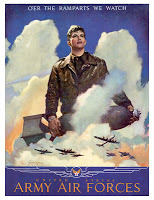 70 Years Ago—Mar. 9, 1943: US Eighth Air Force Central Medical Establishment recommends 25-mission combat tour for bomber crewmen, 200 hours/150 missions for fighter pilots. Rommel returns to Germany for sick leave & to plead decreased bridgehead in North Africa. In lieu of Mardi Gras, New Orleans holds Carnival Day Bond Drive for 25,000 people, sells $1 million in bonds.
70 Years Ago—Mar. 9, 1943: US Eighth Air Force Central Medical Establishment recommends 25-mission combat tour for bomber crewmen, 200 hours/150 missions for fighter pilots. Rommel returns to Germany for sick leave & to plead decreased bridgehead in North Africa. In lieu of Mardi Gras, New Orleans holds Carnival Day Bond Drive for 25,000 people, sells $1 million in bonds.
Published on March 09, 2013 01:00
March 8, 2013
Today in World War II History
70 Years Ago—Mar. 8, 1943: Japanese cross Yangtze River in China near Ichang. US lifts ban on sale of sliced bread, designed to conserve metal used in blades. (Read more: Make It Do - Metal Shortages in World War II )
Published on March 08, 2013 01:00
March 7, 2013
Today in World War II History
Published on March 07, 2013 01:00
March 6, 2013
Today in World War II History
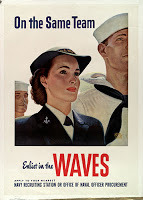 70 Years Ago—Mar. 6, 1943: Maj. Gen. George Patton replaces Maj. Gen. Lloyd Fredendall over US forces in Tunisia. Rommel launches last offensive, at Médenine, Tunisia, but Montgomery repulses. WAVEs change regulations to allow women to marry Navy men after training complete. Norman Rockwell’s “Freedom from Want” appears in Saturday Evening Post.
70 Years Ago—Mar. 6, 1943: Maj. Gen. George Patton replaces Maj. Gen. Lloyd Fredendall over US forces in Tunisia. Rommel launches last offensive, at Médenine, Tunisia, but Montgomery repulses. WAVEs change regulations to allow women to marry Navy men after training complete. Norman Rockwell’s “Freedom from Want” appears in Saturday Evening Post.
Published on March 06, 2013 01:00
March 5, 2013
Today in World War II History
Published on March 05, 2013 01:00
March 4, 2013
Make It Do: Rationing of Canned Goods in World War II
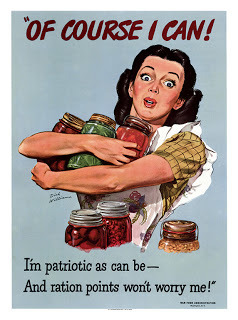
Rationing of processed foods was an important part of life on the US Home Front. A complex and constantly changing system kept the grocery shopper on her toes.
Why processed foods?
Tin was short. The Japanese controlled 70 percent of the world’s tin supply. Tin’s resistance to temperature, shock, and moisture made it an ideal packaging material. The US military used tin for ration tins, ammunition boxes, plasma containers, and for morphine syrettes. The use of tin for civilian purposes had to be curtailed, which meant rationing of canned goods. (See Make It Do - Metal Shortages in World War II)
Food was in high demand. In addition to meeting civilian needs, US farms also fed the military and the Allies. However, an agricultural labor shortage due to the draft and the internment of Japanese-Americans strained the system. Reducing civilian usage of processed fruit and vegetable products through rationing helped reduce the strain.
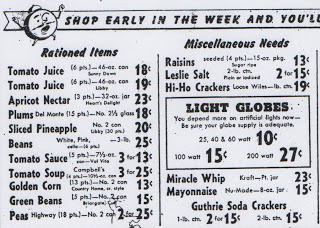
Which processed foods were rationed?
Starting March 1, 1943, three hundred items were rationed, including canned or bottled or frozen fruits and vegetables, canned or bottled juices and soups, and dried fruits. Fresh fruits and vegetables were not rationed, nor were pickles, relishes, or Jell-O.
Points
Each rationed item was assigned a point value, which varied over time due to supply, demand, and region. The job of the grocer became more complicated. Products had to be labeled not only with price but with point value. Each month, point values changed, and the grocer had to re-label.
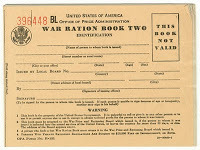
War Ration Book Two
On March 1, 1943, War Ration Book Two became active. The blue stamps provided 48 points worth of processed foods each month. This supplied 33 pounds of canned goods per person per year, which was 13 pounds less than pre-war usage. Rationing calendars were published in the newspapers to help people keep track of which stamps were current. Stamps were good for eight, five, two, or one points each, with no “change” given, so the shopper had to be careful to use the exact number of points. To prevent fraud, the stamps had to be torn off in the presence of the grocer.
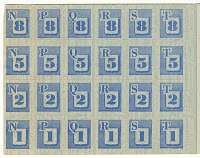
War Ration Books Three and Four
Book Three became active in September 1943, but was replaced by Book Four on November 1, 1943. The system was simplified on February 27, 1944, when all stamps became worth 10 points, and plastic tokens were issued as change.
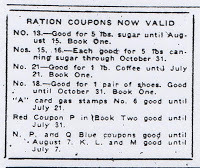
Fluctuations
Point values changed frequently, and items were often removed from or returned to rationing based on the harvest. On September 17, 1944 after a good harvest—and in preparation for the presidential election—all processed foods except canned fruit were removed from rationing, but were returned to rationing on January 1, 1945 due to the demands of the Battle of the Bulge. After V-J Day on August 15, 1945, processed foods were no longer rationed.
Victory Gardens
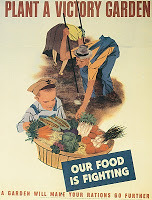
People were encouraged to plant Victory Gardens to reduce the amount of processed foods needed. Newspapers and magazines published how-to articles, and gardens sprang up in backyards, vacant lots, big-city window-boxes, and even on community property. By the end of 1943, Victory Gardens supplied 40 percent of civilian needs for fruits and vegetables.
Canning
To put up this bounty, home canning was encouraged. A poll in January 1944 found that 75 percent of housewives canned, and those women canned an average of 165 jars per year. This met the family’s needs and preserved ration points for foods they couldn’t grow. Extra canned fruits and vegetables were often donated to the needy.
How would you like to deal with a system like this?
Published on March 04, 2013 02:00
Today in World War II History
 70 Years Ago—Mar. 4, 1943: Academy Awards emceed by Bob Hope: best movie—Mrs. Miniver; best actor James Cagney in Yankee Doodle Dandy, best actress Greer Garson in Mrs. Miniver, best director William Wyler for Mrs. Miniver. US 91st Bomb Group conducts first trial of armored flak vests.
70 Years Ago—Mar. 4, 1943: Academy Awards emceed by Bob Hope: best movie—Mrs. Miniver; best actor James Cagney in Yankee Doodle Dandy, best actress Greer Garson in Mrs. Miniver, best director William Wyler for Mrs. Miniver. US 91st Bomb Group conducts first trial of armored flak vests.
Published on March 04, 2013 01:00
March 3, 2013
Today in World War II History
 70 Years Ago—Mar. 3, 1943: During Luftwaffe air raid on London, panic causes 173 deaths in Bethnal Green tube station. In Battle of the Bismarck Sea, Allied aircraft sink Japanese destroyers Asashio, Arashio, Tokitsukaze, and Shirayuki.
70 Years Ago—Mar. 3, 1943: During Luftwaffe air raid on London, panic causes 173 deaths in Bethnal Green tube station. In Battle of the Bismarck Sea, Allied aircraft sink Japanese destroyers Asashio, Arashio, Tokitsukaze, and Shirayuki.
Published on March 03, 2013 01:00
March 2, 2013
Today in World War II History
 70 Years Ago—Mar. 2, 1943: US Fifth Air Force (SW Pacific) B-25s use skip-bombing for first time, in Battle of Bismarck Sea. Movie premiere of The Human Comedy, starring Mickey Rooney.
70 Years Ago—Mar. 2, 1943: US Fifth Air Force (SW Pacific) B-25s use skip-bombing for first time, in Battle of Bismarck Sea. Movie premiere of The Human Comedy, starring Mickey Rooney.
Published on March 02, 2013 01:00
March 1, 2013
Today in World War II History
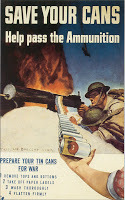 70 Years Ago—Mar. 1, 1943: Atlantic Convoy Conference meets in Washington DC. Gen. Carl Spaatz takes command of US Twelfth Air Force in Algeria. War Ration Book Two issued in US: canned goods and other processed foods now rationed at 2 lbs/wk.
70 Years Ago—Mar. 1, 1943: Atlantic Convoy Conference meets in Washington DC. Gen. Carl Spaatz takes command of US Twelfth Air Force in Algeria. War Ration Book Two issued in US: canned goods and other processed foods now rationed at 2 lbs/wk.
Published on March 01, 2013 01:00



